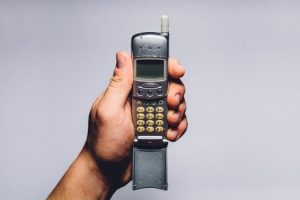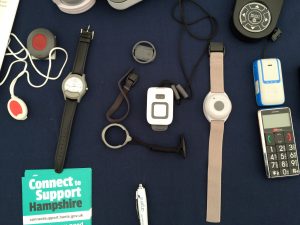By Tula Brannelly
On our ‘Using Technologies for Safer Walking’ project, we are in the process of collecting phase 1 data, and preparing to collect phase 2 data. We are noticing that there is a bit of uncertainty about using GPS technologies in terms of when they might help, and what has to happen for them to work. This short blog aims to answer some of those questions.
If you have dementia and go out alone, it is a good idea to carry something with you so that you may be found if you get lost.
A simple solution is a mobile phone as it has a GPS on it and the police can use it to find you. You do not have to use the phone, just carry it with you. Mobile phones (not smartphones) have a very long battery life and are cheap to buy.
Smartphones can be used to locate people using apps such as ‘find my friend’. If the person who goes out carries a smartphone with them, they can be located by a family member or friend who also has the app. This is useful if you are smartphone users and want a quick and easy solution, and are available for each other when the person with dementia wants to go out and about.
A GPS technology (pictured above) enables you to be found by family members, for example they may use a computer or ipad/tablet to locate the person who is out and about. This means that when you are out and about, they can search for you to see that you are heading in the right direction, or are on your way back when expected. This often provides peace of mind for both parties. For this to work, the person with dementia does not need to actively use the technology, just carry it with them. If they can actively use the technology, then there are variations of the GPS that can be used to make a telephone call, or call for help.
The GPS systems that have the call for help facility usually have a telecare backup element to them. These are available through the web – where you purchase the equipment with a telecare plan attached to it. This means that as well as the family member being able to locate you, the GPS is monitored remotely by a service who are able to locate you and organise to send help, if needed. The person with dementia does not have to actively use this technology, but it does need to be charged and with them when they go out.
A frequent concern seems to be that the person with dementia will not be able to learn to use the equipment, has never been a phone user or will not be able to operate the equipment. If the person carries a GPS, they do not have to actively use it. The difference in carrying a GPS or not may be that if the person does get lost, they can be quickly and easily located, either by family/friends or, if necessary by the police.
People with dementia want to continue to go out walking and they and family members become aware that getting lost may be a problem. From our discussions with people with dementia and their families so far, we have heard accounts of people with dementia having some ‘lucky escapes’ whereby they have been returned home by members of the public having been in potentially risky circumstances. Carrying a GPS can mean that the person can be found quickly and that risk can be decreased.
If you have any questions about using GPS for safer walking, please contact the team at Gpsstudy@soton.ac.uk





